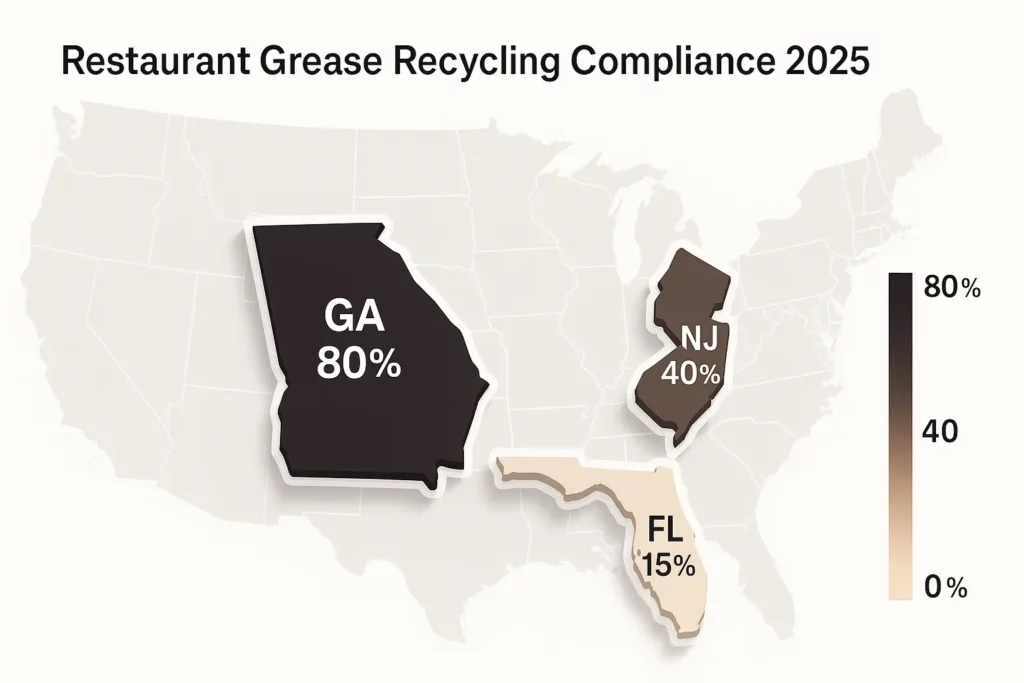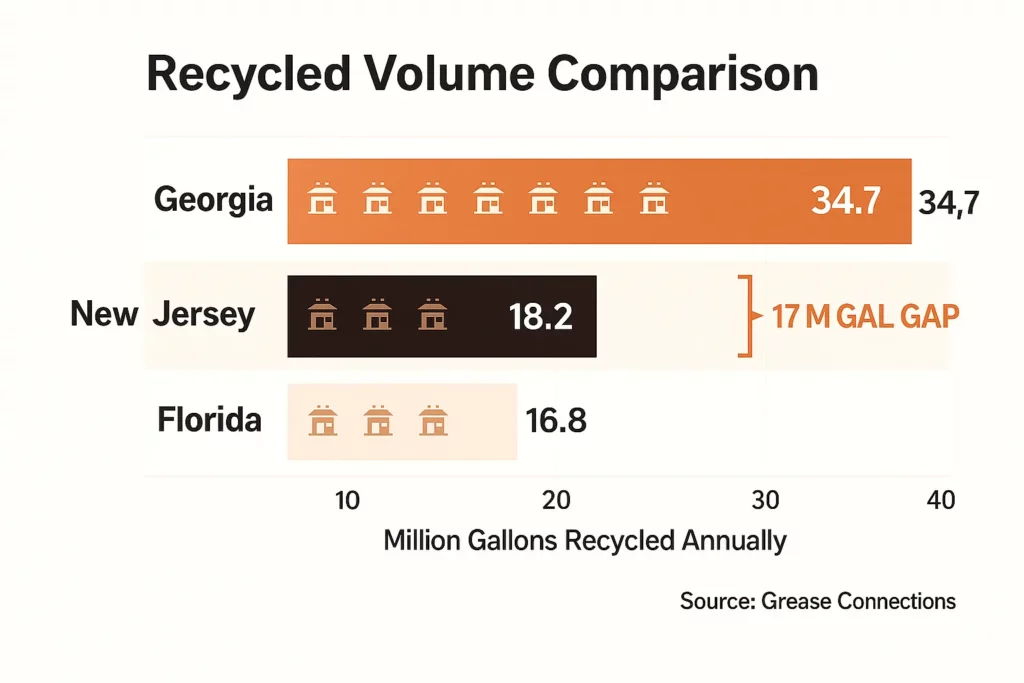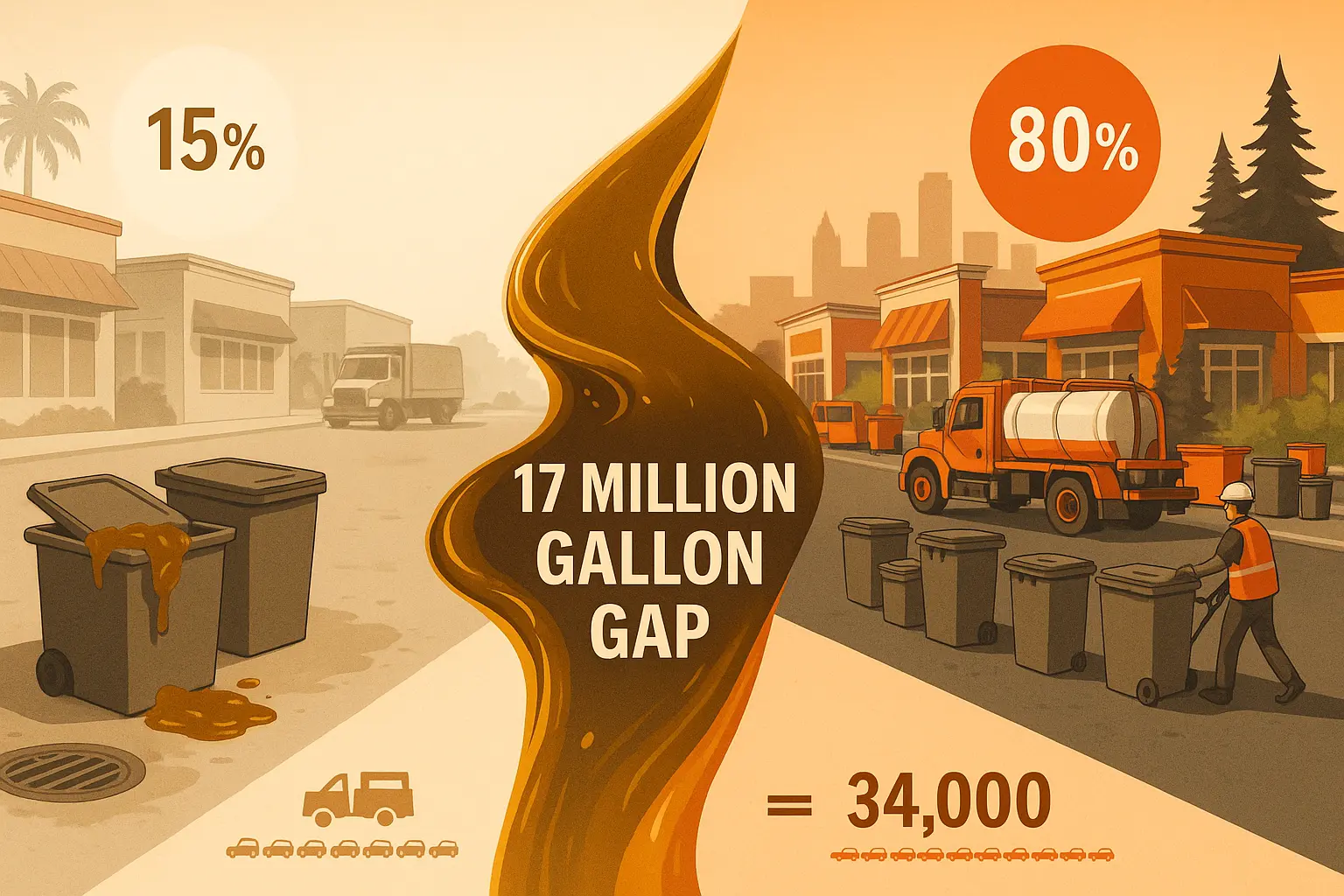Table of Contents
Georgia Surges, Florida Stalls
Florida’s 66,017 restaurants generate more used frying oil than any state in the Southeast, yet only one in seven establishments schedules regular pickups. By contrast, 80 % of Georgia’s 25,505 kitchens file FOG manifests on time, diverting an extra 17 million gallons from sewers every year. That difference alone could power 34,000 biodiesel cars for twelve months enough to offset every ride share trip during Miami Art Basel. According to Grease Connections’ 2025 manifest analysis, the gap is widening despite new legislation meant to curb sewer overflows.

How Much Oil Are We Talking About?
| State | Restaurants (2025) | Avg. Waste Oil per Restaurant (gal/yr) | Total Oil (M gal/yr) | Recycled Share (2025) | Recycled Volume (M gal/yr) |
|---|---|---|---|---|---|
| Florida | 66,017 | 1,700 ± 50* | 112.2 | 15 % | 16.8 |
| Georgia | 25,505 | 1,700 ± 50* | 43.4 | 80 % | 34.7 |
| New Jersey | 26,843 | 1,700 ± 50* | 45.6 | 40 % | 18.2 |
Georgia’s Playbook: Mandatory Manifests & Monthly Audits
Since 2019, Georgia EPD Rule 391 3 6 .24 has required every hauler to upload digital manifests within 15 days, enabling inspectors to spot missed pickups and grease trap bypasses in real time. Municipal sewer authorities now train code officers alongside health inspectors, creating a single enforcement visit rather than two. Compliance jumped 28 percentage points in the first year.
Why Florida Lags Despite New Law
Senate Bill 1110 (2022) finally mandated haul off manifests, but the program remains voluntary until December 2025 and excludes restaurants under 25 lbs/day output effectively most mom and pop eateries along the coasts. Counties must fund their own portal integrations, and only eight of 67 had it live by Q1 2025. Tourism churn compounds the issue: seasonal staff often forget monthly pickups, causing traps to overflow and fats to harden into “fatbergs” that cost utilities $100 million a year to clear.
New Jersey’s Middle Ground
New Jersey adopted a product stewardship model in 2021’s Food Waste to Energy law, letting haulers offset fees with Renewable Identification Numbers. Participation sits near 40 %, buoyed by stormwater runoff penalties that make FOG violations a budget line item for coastal towns. The state’s dense sewer grid means even moderate gains slash combined sewer overflows during hurricanes a policy hook Florida legislators now study.
Clean Water Stakes Are Rising
Uncaptured grease congeals at 90 °F, clinging to pipe walls and trapping other solids. The EPA links 47 % of U.S. sewer backups to FOG blockages. Each thousand gallons diverted keeps 1,700 lbs of carbon out of the air when burned as biodiesel versus landfilled sludge critical in estuaries already battling nutrient runoff.
The Business Case for Restaurants
Grease Connections pays Florida kitchens $0.34 $0.40 / gal and Georgia up to $0.43, turning a liability into $285 $600 in quarterly rebates for an average fryer bank. Operators who install sealed outdoor tanks cut slip and fall claims by 42 % and gain points toward local food service inspection scores. Action plan:
- Book a manifest compliant hauler and lock collection dates in your POS calendar.
- Retrofit old 55 gal drums with gasketed lids to deter theft.
- Upload pickup receipts to your stormwater file auditors now ask for them.

Closing the Gap
Florida’s new rules arrive just as biodiesel demand peaks; closing the 17 million gallon gap could offset 150,000 metric tons of CO₂ next year. Restaurants that act now will bank higher rebates before the market saturates. Schedule a Grease Connections site audit this month and put your kitchen on the right side of the grease gap.









